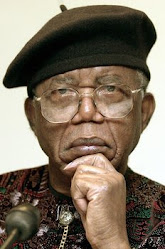 After reading the first two sentences in this book my immediate thoughts were: ‘This is not pidgin english…' The buzz I picked up about this book was that it was written in pidgin English. If you heard the same and are expecting to see “Wetin?” and “na u sabi” kind of pidgin in here you will be disappointed. It’s not Nigerian pidgin Iweala's protagonist narrates in, it’s broken English, the sort that is not peculiar to Nigeria or any other West African country.
After reading the first two sentences in this book my immediate thoughts were: ‘This is not pidgin english…' The buzz I picked up about this book was that it was written in pidgin English. If you heard the same and are expecting to see “Wetin?” and “na u sabi” kind of pidgin in here you will be disappointed. It’s not Nigerian pidgin Iweala's protagonist narrates in, it’s broken English, the sort that is not peculiar to Nigeria or any other West African country.
"Beasts of No Nation" is Iweala’s intrepid debut novel. The protagonist Agu is a child who is torn from his family by war, found by rebels and forcibly conscripted. As he goes through the daily horrors of living with the rebels and fighting the war, he flashes back to the happier times in his life before the madness of war comes and shatters the lives of his family and community. The women and girls are shipped away from his community for protection while the men and boys remain to defend the town in one last act of bravado. Now Agu is at the mercy of the rebels who have found him and he’s answerable to their commander who has other uses for the young boys under his domination. Exposure to the language, savage behavior, sexual acts and violent murders of the rebels changes him and he matures quickly. He may be tough enough to kill people by butchering them with a shiny matchete but inside he’s still barely out of childhood. The scenes of war will haunt him even in his place of refuge where he’s being rehabilitated.
This book is not the “unputdownable” sort but it is quite interesting. Iweala comes through nicely at the end. There are a few flaws I have to point out. Often times in his use of pidgin, the protagonist Agu uses words or sentence constructions that someone of his age and educational level wouldn’t be able to execute. Agu doesn't use them in that flashy, misplaced way uneducated people use big grammar and so those moments seem out of place, like Uzodinma Iweala couldn't find the right way to convey whatever needed to be expressed in broken english. Sometimes too Agu’s narration, especially the war bits, lack realism. There’s no doubt in my mind that the pidgin lends a flavor to the story telling and it's great that Iweala tells it in this fresh and impressive manner. This book make plenty sense o! Make una try read am, the boy try well, well, well.
“Uzodinma Iweala was born in 1982. He graduated from Harvard University, where he was a Mellon Mays Scholar and received a number of prizes for his writing, including the Eager Prize, the Horman Prize, the Le Baron Prize , and the Hoopes Prize, awarded for outstanding undergraduate thesis. He lives in Washington, D.C., and Lagos, Nigeria” – Biography from book jacket by HarperCollins Publishers
Book cover image
Book cover image




















Nice review, Well done. I heard about it when it first came out and was quite impressed by the other reviews though I've not read it yet.
ReplyDeleteThank you very much. Pick it up if you can.
ReplyDeleteGreat review and I love the real pidgin at the end haha. I'm yet to finish this - as you know from my post. I like your honest review here though. I now know what to be cautious of :)
ReplyDeleteThank you Darkowaa! I can't wait to see the adaptation that will be released on Netflix. For stories about boy soldiers you should check out Ishmael Beah's "A Long Way Gone: Memoirs of a Boy Soldier". I have the review on my blog. It's the best one I've read so far.
DeleteI've heard of Ishmael Beah's books but I haven't been interested in reading them. I feel like 'A Long Way Gone: Memoirs of a Boy Soldier' would be depressing, but I'll read your review and see.
ReplyDeleteYeahh I know what you mean. Please do check it out.
Delete